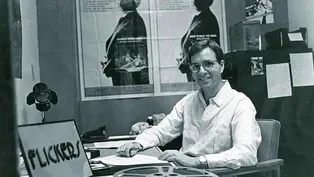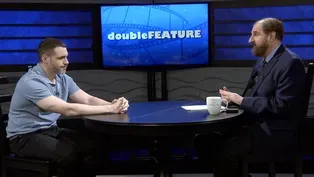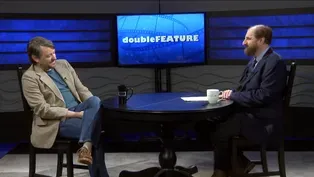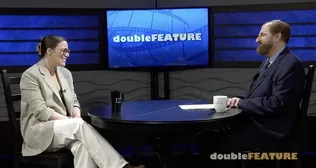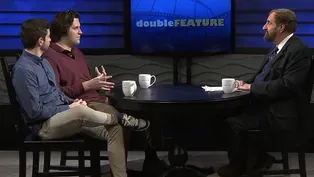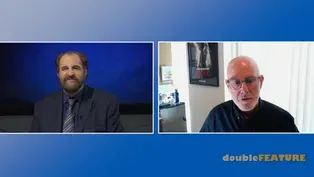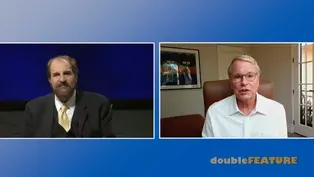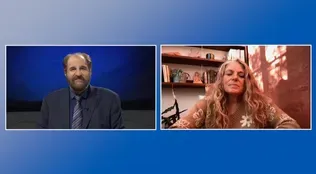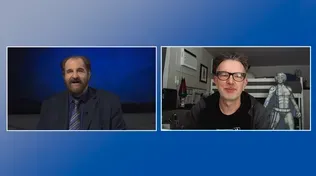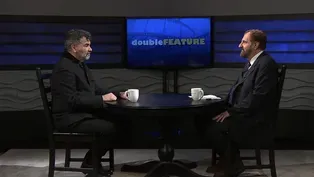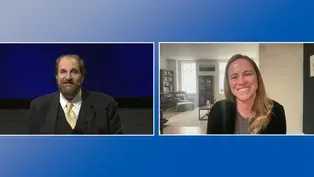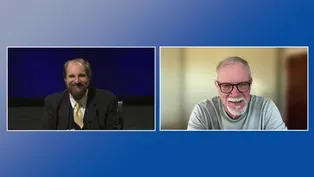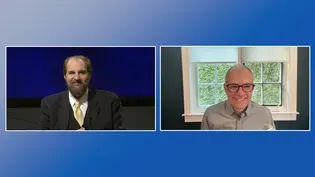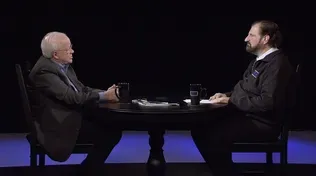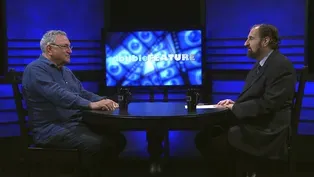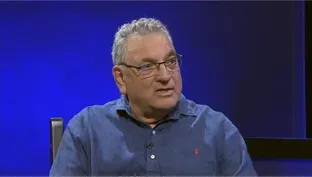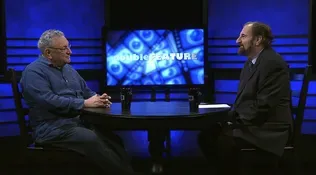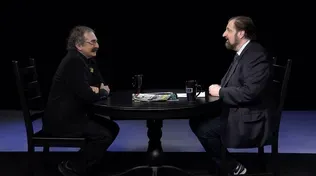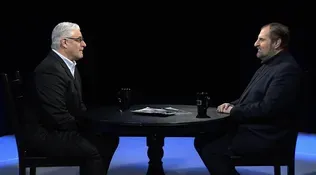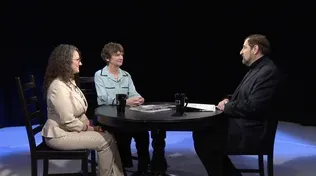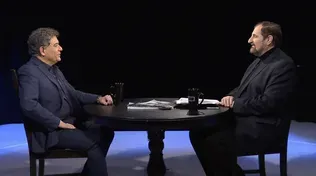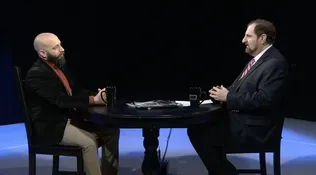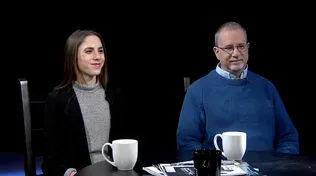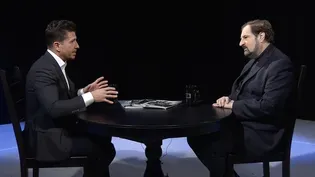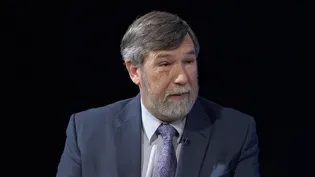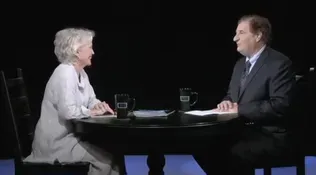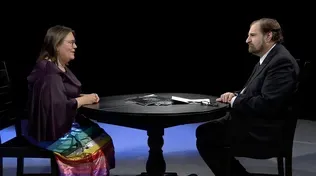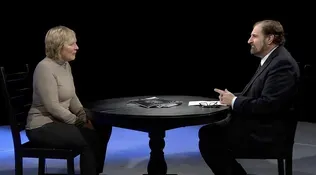
Interview with Alex Berard
Clip | 45m 2sVideo has Closed Captions
Interview with Alex Berard.
Steven Feinberg Executive Director of the RI Film and TV Office interviews Location Manager Alex Berard.
Problems with Closed Captions? Closed Captioning Feedback
Problems with Closed Captions? Closed Captioning Feedback
doubleFEATURE is a local public television program presented by Rhode Island PBS

Interview with Alex Berard
Clip | 45m 2sVideo has Closed Captions
Steven Feinberg Executive Director of the RI Film and TV Office interviews Location Manager Alex Berard.
Problems with Closed Captions? Closed Captioning Feedback
How to Watch doubleFEATURE
doubleFEATURE is available to stream on pbs.org and the free PBS App, available on iPhone, Apple TV, Android TV, Android smartphones, Amazon Fire TV, Amazon Fire Tablet, Roku, Samsung Smart TV, and Vizio.
(film wheel whirring) (dramatic music) (dramatic music continues) (upbeat music) - Hi, I'm Steven Feinberg, Executive Director of the Rhode Island Film & Television Office.
Our guest tonight is a terrific Rhode Island location manager who's worked on such amazing productions as the Emmy Award-winning HBO series, "The Gilded Age", Walt Disney's "Hocus Pocus 2", and most recently on the James L. Brooks 20th Century Studios film, "Ella McCay", starring Jamie Lee Curtis, Woody Harrelson, and Emma Mackey.
I am happy to welcome Alex Barard to "doubleFEATURE".
How are you, buddy?
- Good, Steve, good.
Thank you for having me.
- So, you've been working on a ton of projects these last few years.
Most recently, "Ella McCay", with James L. Brooks directing.
He had done "The Mary Tyler Moore Show", "Taxi", Executive Producer of "The Simpsons", and he wrote and directed "Terms of Endearment", "As Good as It Gets", and "Broadcast News".
How was it working with James L. Brooks?
- It was incredible.
I mean, not too often you get to work with a guy like that.
He's such a legend in our industry, and yeah, it was just very cool to be a part of this project and to see his process and how he works.
It's sort of this old school style of filmmaking that you don't see as much nowadays.
So, yeah, it was a very, very enjoyable experience.
- A real gentleman, wouldn't you say?
- For sure, yes, yeah.
Jim's a super nice guy, and he's got the best laugh in the industry.
If you ever hear him laugh, he's just a... And a great sense of humor, obviously, with the work he's produced.
So, it was really, it was fun.
And it was hard 'cause he's very...
He's clearly very passionate about what he's putting on screen, and he puts a lot of thought into the process.
So we were bouncing back and forth between location ideas and sort of scrambling to find exactly what he wanted.
- So let's share with the audience, this is a story about, and it's set in the 1980s or '90s?
- So it jumps around, the story starts, 'cause you see our main character basically throughout her life.
So, from, I think the ages of 16 to 36.
- And that's the character of Ella McCay.
- Yeah, so you see everything from the '80s up to what is present day in our project, which is 2008.
- Right, so she plays, like, a lieutenant governor that becomes a governor, or is offered the position of becoming a governor.
And it stars, like, Albert Brooks, and it's got Jamie Lee Curtis and Woody Harrelson.
And the project started out, we had been approached at the film office to, you know, find some locations.
They sent us the script, and we had gotten pictures of the State House, since that's a major part of the story.
And then we ran around just to offer ideas for Rhode Island so we'd be in the conversation.
And then I believe Jim said, "Oh, I like the State House.
I like some of these images."
And then you were brought on.
So when Jim came flying into Rhode Island, you took over.
- Yeah, so when he came in, as you said, we knew he was here for the state capitol, and which is a big part of the, you know, the production, you know, a movie about a lieutenant governor, we're in the state capitol a lot.
So that was sort of what grounded us here.
But then there was, we need all these other pieces.
We had a bar, we had houses, we had schools, a lot of things that we needed to kind of fill in the blanks for.
So, he got here, we started running around town, looking at different things, trying to get a sense of what it is he was, you know, what he is envisioning.
You know, every director, they have a different process.
With Jim, it was very, you know.
He's very fascinated by, I think, real life and real people and how things work and people's thought process.
So we were driving around, and he'd just see things and go, "Oh, this is," you know, "Stop the van, stop the van.
This is something of interest," you know?
And just a random building on a corner or whatever, so.
- Like, for example, we were trying to figure out what kind of... We took a bunch of pictures of bars, right?
So, what kind of bar is it gonna be?
Now, he might not know until he sees the bar, right?
To start to focus.
And then he wanted a bar, you told me, he ultimately wanted a bar with a big window.
- Yeah, so he... We looked at a lot.
So one of the other big pieces to the film, aside from the state capitol, was this bar location where a lot of the movie takes place.
And we looked at all sorts of bars.
We looked at, you know, we tried to give him a variety of stuff.
We probably scouted 50, 60 different bars all around Rhode Island.
But he wanted a real neighborhood bar, something, you know, a la "Cheers", you know?
And yeah, one of the important pieces to it, you know.
Typically, a location like this that's so, you know, important in the film, they might just build on a stage, but because this particular location, there's a lot of connectivity to the street with cars pulling up and things happening on the road, it had to be on location, and it didn't make sense, because we couldn't have, you know.
So he wanted windows out to the street because... And when you see the movie, you'll see there's a lot of pieces of cars pulling up, people going in, people coming out.
So we wanted it to be a real physical location on the street.
And yeah, we ended up finding a vacant space that we were able to kind of get the best of both worlds.
We could create the bar from scratch.
The designer, Rich Toyon, he did an incredible job kind of creating this bar.
You know, the space we ended up using was literally gutted to the studs when we went in, there was nothing in there, and we turned it into a bar.
- And people in the neighborhood thought that it was a real bar that had opened.
- Yeah, yeah, and it was on Broadway in Providence, which is a beautiful street in Providence, the architecture, everybody, you know, you get great, great views outside, and we had an incredible build inside, and yeah, locations like that are always, you know, I take a little pride in it at the end, because you see it all come together and see how well it works.
- And it came from nowhere.
- Yeah, and it came from nowhere, and it's, you know, a bit of my doing, a bit of the designer's doing, and we created this location from scratch.
- Yeah, and we wanna also give a big kudos to the Providence Police Department, because they're controlling traffic and doing a fabulous job, Sergeant Mike Martinez over there.
- Yes, he's a great guy.
Those guys have helped us countless times on so many different projects here in Providence, and Mike gets the process, and yeah, 'cause we had to do detours and street closures and, you know, we had rain towers at certain points.
There's a lot that goes into it.
- Let's talk about what a location manager does.
So you'll read a script.
- Yep.
- And you'll look at a script and say, "Okay," there's a governor's house, as an example, a governor's.
So, okay, here are some places you think where this governor's home could be.
And in this case, you went to Bristol, Blithewold Mansion, correct?
- Yep, yep, Blithewold Mansion.
- So now you go over to the folks at Blithewold.
What are you doing, and tell me, for the audience, what you're doing to make this location work and what your responsibilities are.
- Yeah, so in the case of Blithewold, you know, it's a mansion, it's a museum, it's, you know, 1800s mansion that you go in and it's a lot of the original furniture, original pieces in the house.
So, locations like this can be very sensitive.
So we played it as the Governor's mansion in this last movie, so for me, it's, you know, coming in, speaking with the people in charge at Blithewold, who are all super helpful and very understanding of what we're trying to do on this project, because we were sort of all throughout the house, our character sort of running around the house and looking at all the different rooms, so.
- You have to make sure that the location's available, right?
It's one thing to say, "Hey, Director, there's a great looking location," but if it's not available, what's the point?
- Yeah.
So with Blithewold, they...
It kind of worked out.
So they close for the winter months.
So when we first reached out to them, we said, "Hey, we have one day of filming we wanna do here," and of course, on our original schedule, it was in April.
And they said, "Well, we open to the public April 1st," so it was sort of figuring that out.
We ended up pushing it back in our schedule to, or pulling it up to mid-March to- - Accommodate them.
- Yeah, accommodate their needs so we can be out.
We actually ended up shooting there the week before they opened.
- Oh.
- So, we got in, we had to figure out, there was a lot of back and forth about what we could do furniture wise, what could be moved, what couldn't be moved, what could be touched.
So we try to plan as much as we can in advance, and then on the day we go there, you know, me and members of my staff anxiously stand in the corner and watch everybody filming while we're chewing on our nails, making sure nothing breaks and gets, you know, it all goes according to plan.
- And you create a contract with the Blithewold and you pay 'em a certain fee that it's worth your time.
- Yeah, yeah.
- And you always wanna make, and you guys, it's you and Casey Reagan and Bob Paquette and Olivia, and you had a PA, Bella, this year.
- Yeah, yeah, we've got a really good staff.
- You have a great staff.
And you guys, and I know it comes, it stems from your leadership, but you guys are the outstanding ambassadors to Rhode Island film community, production community, and the people out on the street.
And you guys always do a wonderful job.
You're thoughtful.
You leave locations in the same condition or better than when you found it.
- We try, we try.
In most cases, yeah.
- And green always works, right?
- (laughs) Yeah, yeah.
So yeah, the way it works is, you know, as the location manager, I have a staff of, you know, anywhere between, depending on the size of the project, eight, 10, 12 people.
But what I will do is I have assistant location managers, someone you mentioned, Casey and Olivia and such, that I will assign to specific locations.
So while I'm overseeing all the locations on the project, I'll have an assistant location manager assigned to one specific location, and they kind of go all in on that location.
Meet everybody who surrounds, you know, becomes very familiar with the location owner, the neighbors, 'cause you know, I can't be running around to all the locations constantly.
So they're in place, and they're people I trust who I know have a lot of respect for the location, for the owners, and wanting to... A lot of 'em are Rhode Islanders.
We wanna be able to keep making movies here, and we wanna leave a good impact on the location and the neighborhood.
So yeah, I have a team that I've worked with for a number of years now that I really trust, and they do a great job.
- What made you get into becoming a location manager?
How did that journey start?
- So, I went to, you know, I went to film school, going all the way back.
I mean, my mother was an educator, so college wasn't really an option.
She was like, "You're gonna go, just figure out for what," and at the time, I said, "I don't know," you know, I liked movies.
I was like, "Movies are fun, I enjoy watching films."
So, I went to a film school in Keene, Keene State College.
It was in New Hampshire.
Great little state school.
We had a really good film program, learned, you know, what film's all about and sort of the collaborative process that film is.
And when I got out, I started putting feelers out for different projects, trying to figure out, you know, what I'm gonna do.
And I got called to go work on this movie down in New York City called "It's Complicated", Meryl Streep, Alec Baldwin.
I literally- - Pack up.
- Packed my bags, and I had to start in like a week or something.
They hired me as a stage manager, which basically, I was like the janitor of this big, old building that we were building some sets in, in Brooklyn.
And I worked on that project for, it was close to a year, start to finish, it was a big job.
But I kind of hung out at the stage, I took the trash out, I, you know, restocked the toilet paper, made coffee.
It was, you know.
- You made yourself useful.
- Yeah, but I kind of watched and observed, like, the industry, 'cause at that point, I didn't really know which direction I was gonna take.
You know, I was just impressed by the whole process.
And then I met some of the location guys on that show, and to me, it seemed like very interesting that they get to go to all the locations.
'Cause at the time, I was sort of stuck at the stage.
The production would come and film for a few days- - Leave.
- And then disappear for a week on set, and I was like, "Oh, man, it must be so cool to go."
- You had abandonment issues.
- (laughs) Yeah, yeah.
So, at the end of that job, I talked to the location manager and said, "Hey, I would love to, you know, give it a shot if you ever need someone."
- [Steven] Move in that department.
- Yeah.
I'd love to try out location.
'Cause for me, it felt like a good way to learn even more about... 'Cause as a locations person, you work with all the departments.
Anybody who needs something from the location, or a request, comes through the locations department.
So, it felt like a really good place to learn the industry and learn, you know, what everybody does and- - And what their needs are.
- And what their needs are.
And, you know, if I would wanna go into any of these other departments.
So, I ended up in locations, and I quickly learned, like, watching all these departments, I'm like, "Nope, don't wanna be a grip.
Nope, don't wanna be a camera guy.
Nope."
And then ultimately, I think I stayed in locations long enough and just realized, like, I enjoy this, 'cause I not only get to be part of the filmmaking process, I get to be, you know, I deal with the real world, you know, and the people, you know, 'cause- - But you also get to have that one-on-one time with the director, or if it's the writer producers, you have that.
You're sitting in a car a lot of times, right?
- Yeah, that's the other thing I really enjoy, is you get to, you know, 'cause I learned all about day players and people who come in on a show, work one day, and then leave, which to me felt, you know, strange, you know?
I like being there start to finish, and like, with locations, you're typically one of the first people on till the very end, and you get to see the whole process.
Like, you know, yeah.
And once you start scouting and you become a location manager, you're there at the very beginning while the director's sort of conceptualizing the project and you're driving around in a car with 'em and listening to the conversations between the DP and the designer and the producers and seeing it all come to life from the ground up, and to me, that's always been pretty interesting.
- Have you ever had an opportunity where a director wants a certain location and you can't deliver?
Has that ever happened?
- Yes, we've had...
I've run into that situation a couple of times, where a director sees something that's presented to them before I'm on board and sort of falls in love with it.
There was an instance, not to call out anybody, but the Massachusetts Film Office, they showed a director a location from some files that was not- - Available.
- Not available, not clearable.
And the director wouldn't relent, we just kept going, and he had me trying everything to get into the...
It was this kind of funky spot in Chinatown that, like, is apparently notorious, like, they don't let you film there.
And we tried and tried, and the producers were coming, and they were trying every angle they could, and ultimately, we just couldn't, and we had to figure out something else.
But I try to make everything available.
I've always had a great experience here in Rhode Island, you know.
- Of course.
- I tell everybody here, you know, when we start these early scouts, they say, "Oh, do you think we can do it?"
And I say, "Well, this is Rhode Island, anything's possible."
- Anything's possible.
That's right, that's right.
- Yeah, I mean, as you know on this last one with the State House, you know, we took residency in the Governor's office for the better part of a month.
- The Governor was topnotch, and his staff, they relocated for this movie.
I don't know if we ever would've had such a kind, flexible governor, and their staff, and they were exceptional.
And I loved how you and your team really handled it with velvet gloves, and you were very thankful and grateful and it was really great.
Let's talk about some of the other projects.
Let's talk about "Hocus Pocus 2".
- "Hocus Pocus 2", yeah.
- "Hocus Pocus 2".
So that film, well, we used the Cranston Street Armory to build a forest, right?
- Yes, yep.
- We went to Newport.
We were in North Kingstown.
- [Alex] Yep.
- There was a set built there.
There was a farm in- - Lincoln.
- Lincoln.
- Yep, Chase Farm in Lincoln.
- Let's talk about that.
That had a... A 1600 Salem village was created there.
- Yeah, yeah.
So, "Hocus Pocus" was an interesting one, 'cause they'd done the first one in Massachusetts, and we were trying to recreate Salem, basically, which anyone from New England knows you can...
These sort of towns, New England towns can play for one of each other.
- And one of the assets that we had to lure this production to Rhode Island was that we had the Cranston Street Armory, with its ultra high ceilings.
And the idea was that if they needed to fly witches inside there, we could, and that was one of our selling points, and we have a nice tax incentive program that's competitive with the rest of the country.
- Yeah, yeah, and the Armory's been a great resource.
We've done a couple projects of it.
We were just in there again for "Ella McCay".
But yeah, there was one piece they were looking for was the Salem village, and there was talk of going to Plimoth Plantation in Massachusetts, which they had done on the first project.
And then the idea came of, well, maybe we can create something here in Rhode Island.
So, I was sort of out and about with the designer, scouting.
- And you knew that there was lots of opportunities, right?
- Lots of opportunities.
And there was one particular space that I was very familiar with, 'cause I take my dog, Daphne, there all the time.
And I said, "Let me show you this."
- Now, let me ask you something.
Did you discuss it with Daphne first?
You said, "Daphne, I need some locations."
- I talked to Daphne.
I said, "Look, we might take over the park for a bit."
No, she was totally on board with it.
But no, we went to this...
It was a former farm that got donated to the town of Lincoln, and it's just a big, open, green space that they bring, you know, they have festivals in, and you can bring your dogs there.
And I took our designer there, and there's rolling hills, and it just, it was a perfect backdrop, you know, to build a few sort of- - [Steven] Rolling hills and trees.
- Yeah, build these 1600, you know, little huts, and it really came out.
But what started as sort of like, "Oh, we'll do a couple facades and it'll be this small thing," grew into us building an entire village.
We took over the whole park.
I mean, like, national news people were coming from all across the country to see, you know.
"Hocus Pocus" had a huge following, so we had people coming from all over the place to see the village and visit, and we had to have 24 hour security out there 'cause- - And people had drones, like, private drones.
- But, you know, ultimately, you know, and I was dealing with the town of Lincoln and trying to navigate all that attention.
And, you know, it was a lot during the time, but I think now looking back, the town is really happy that- - They loved it.
- They put 'em on the map for a lot of people.
- I remember talking to the town manager, he said, "Oh, yeah, we got a lot of heads in the beds at the hotels that we normally wouldn't have."
A lot of people came from out of town.
And they did a fabulous job.
I remember it being like a muddy day of filming, and it kind of set the tone.
There was a mist.
And they had pigs and they had all kinds of animals there and chickens, but they really sold it, and you did a fabulous job.
- Thanks.
- And those folks were happy there.
And then also in Newport, in the town square.
- Yeah, yeah, Newport.
Newport was another huge resource to us.
I mean, Washington Square in Newport is this great...
It has a very classic New England vibe with a lot of red brick and church steeples, and that played as sort of our downtown Salem.
And we did a huge Halloween festival.
- The dance, singing.
- And the dance, we put up a big stage with rock and roll truss, and like, they had cranes so the witches could fly in and out.
And you know, Newport is another city here that's always, you know, as long as you don't come in the middle of the summer during peak season, which we weren't, we were there in the fall, there'll, you know.
They're used to big crowds because it's a big tourist destination for, you know, the mansions and everything.
So, they're very accommodating.
The Newport Police are super helpful.
Lieutenant Naylor down there, he's helped us on a lot of projects.
But yeah, we took over the whole Washington Square for over two weeks, we had the whole thing shut down with booth, and it went really well.
Another one everybody came out to watch and see, and yeah, it's fun to be sort of the guy who gets to, you know, bring this to businesses and talk to people and, you know, watch it all.
- And then you had holding of all the extras at the Jane Pickens Theater.
- Yeah, Jane Pickens Theater.
I mean, one of the nice things, too, about my position is, you know, when we find these locations, you know, I'm given a certain budget to sort of, you know, spread the wealth around to, say, you know, the businesses.
- Sure.
Economic activity.
- Yeah, yeah, let people see the benefit of having a production here directly.
I mean, there's obviously a lot that goes into crew, like, housing and restaurants and stuff, but for me, it's literally, you know, paying- - Small businesses.
- Small businesses, "Hey, can we use your space for a day?
Can we put a sign up?
Can we have the extras hang out in here?"
And we get to, you know, cut people checks that, you know, in places like Newport, like, off season, when they're probably not, you know, making- - Sure.
- You know, what they normally do, so it's a- - It's a boost, and it's a boost to hotels as well.
Let's go into another project now we're in Newport.
Let's talk about the Emmy Award-winning HBO series, "The Gilded Age".
- "The Gilded Age", yeah.
- So "The Gilded Age" is created by Lord Julian Fellowes of "Downton Abbey" fame, and it's an American version.
And that was a show that originally came from the head, the brain of Bob Greenblatt.
Bob I had met when he was the head of Showtime.
We did "Brotherhood".
Then he moved to NBC, and he was the one who approached Julian Fellowes about doing an American version.
So I reached out to Bob and I said, "Hey, you need to make it in Newport because we have the highest concentration of Gilded Age homes," and he was like, "Steve, it's premature.
They're still doing 'Downton Abbey'.
There might be a 'Downton Abbey' movie."
And I talked very often with Trudy Coxe, the head of the Newport Preservation Society.
Well, it took us 10 years to finally where they were ready, and Julian came to Newport for the first time with his working partner, Gareth Neame, and with the director, Michael Engler, and Bob Shaw, the production designer.
And I said to Julian, "What do you think?"
He said, "It's one thing to read about Newport, it's another thing to see it in the flesh."
And then we talked to HBO and we did a little fixing of the tax incentives, that if you spent a minimum of $10 million in Rhode Island in a one year period, even though it wasn't the anchor location, you didn't have to shoot 51% of the show, but we tailored it a little bit, we were able to bring the series to Rhode Island.
And then you come aboard, and now you're dealing with the individual scripts and you're dealing with the details and you're working with the Preservation Society.
- Yeah.
- How was that?
- It was great.
The Preservation Society have been huge help on those.
As you know, those guys have been wonderful to deal with.
And you know, somewhat going back to Blithewold, being in these, you know, these museums, basically, that are filled with, you know, priceless artifacts and furniture and paintings and things, and bringing a whole film crew and the equipment and cranes and everything into those spaces and trying to film, it's always a challenge.
The Preservation Society has been a huge help, their staffs there.
- Phil Pelletier.
- Phil Pelletier, Trudy Coxe.
You know, they've really accommodated a lot of our needs.
And, you know, what was great with that one, the first season was still- - [Steven] We were doing that during COVID.
- [Alex] Yeah, it was the tail end of COVID, so all those mansions were closed to the public at the time, which was great for us.
- [Steven] Plus, no weddings could happen.
- [Alex] No-weddings, yeah.
- [Steven] It wasn't the tail, it was the height of COVID.
- Yeah, and we got to, you know, I think, you know, provide the Preservation with a boost when they needed it, you know?
- Big time.
And the hotels.
The hotels were dead.
- Yeah, so season one was great.
Season two was a little trickier, 'cause now everything was open and we had to sort of navigate, you know, being there.
You have cruise ships that come in, and there's tours, and working all that out.
But those guys have been great.
We got season three coming up.
- September.
- Yeah, September, we'll start prepping.
We're gonna film in October back at some of the mansions.
But yeah, it's been a fun project, 'cause with that specific show, you know, we're getting to go into those locations and use them as they were originally intended, you know?
Like, with Blithewold, we were saying, oh, it's a governor's mansion, and whatever, it's present day, but these are like, we're literally going back and bringing the servants, you know, into the servant quarters and the kitchens, and seeing how- - [Steven] It's Newport.
- Yeah, seeing how the building would've operated, you know, 200 years ago, so.
- What I love about it, too, is the care and authenticity.
Even when they were filming at the Tennis Hall of Fame, the Newport Tennis Hall of Fame, and I remember saying, "You gotta see the Tennis Hall of Fame."
It's the grass courts, right?
- [Alex] Yeah.
- [Steven] And then what they did was with the netting, they even made the netting right for the time period.
- Yeah, yeah, well- - Not that you or I as an audience member would know, but it was important enough to them.
- Yeah, I mean, I think Julian's a big stickler for being authentic and, you know, as detailed as the place settings, and yeah.
The clothing, everything, they're very...
They pay a lot of attention to detail on that show, and they want it to feel authentic and want it to feel real.
And that's what's great about being in Newport, is we have so much of it there that's been untouched since the Gilded Age.
You know, it's still intact, and it's great to- - I remember saying to Trudy, you know, 10 years ago, "I wanna know everything that we have to offer them, just to make it undeniable."
And then what's really neat, too, is when you start something like this, and that's what's different from television than movies, if I were to say, "Bertha and George Russell," while we were making the first season, nobody knew who we were talking about.
Now if you say, "George Russell," people would just spin around to find out who they are.
You know, "Where are they?"
But I think that the show has been really beautifully brought to life, that time period.
And I know that Trudy and Phil are really happy with what you guys, how you've been really careful with everything, so that they can come back, they love- - Yeah, you know, you do a show like that, and every season, it's like, you go back and you see all the old faces, and it's, you know, it's kind of fun, and you start to- - Let me ask you this, 'cause there's a lot of outdoor stuff, too, that's period, with horses, and one of the locations is the Eisenhower House that you used.
Talk about that and what it was like filming there, and the horses coming in and all that stuff.
- Yeah, yeah, I mean, working with horses is a whole nother thing, 'cause for us, we have to find places for the horses to be, and you have horse trailers.
'Cause, you know, one of the things we're in charge of figuring out is parking, you know, which we already have a ton of trucks and cars, and now you have horse trailers, and it's like a whole nother level of...
In a space like Newport, where parking is limited to begin with, it provides a challenge.
- You always have to have, like, a base camp, right?
- Yeah, base camp, base lot for all the campers and the trucks, and it's a lot of, you know, a lot of parking.
- A lot of logistics.
- A lot of logistics.
But with the horses, it's fun, 'cause what we do is, you know, we'll dirt the roads and bring it back.
So yeah, we were at Eisenhower House, you have to lay down dirt, 'cause we didn't have pavement back then.
And we did a scene on Clark Street in Newport, which was a great little, you know, period appropriate street that we covered the whole street with dirt.
- Is it just you put something down before you put the dirt down?
- Yeah, there's different ways to do it.
I mean, you have to cover, like, sewer drains, so we're not dumping, you know, dirt into the sewer, and they'll put stuff down.
And even at the mansions, we'll have to dirt, like, the driveways leading up to the mansions.
- And who are you dealing with as far as state or city government, as far as making sure you don't cover- - Yeah, I mean, it depends on the location and, you know, what the property is.
But there's a lot of, you know, where we're dealing with Newport City Hall, we go in and- - [Steven] Erin Mulligan?
- Yes, yep.
Yeah, so we'll go in.
A lot of times, we try to just have a sit down with all parties needed at once, so we can have the conversation and, you know, if anybody has issues, they can- - So you'll have the police department, fire department, everybody, planners, everybody.
So everybody's all working together.
- Yeah, ideally.
You know, first season, it was a lot of Zoom calls, because again, it was still COVID, but yeah, we try to, you know, get everybody who might need to be involved involved from the beginning.
So if things are like, well, we're gonna have an issue with this, we're gonna have an issue with that, you gotta pull this permit, you gotta pull that permit.
So we try to, you know.
Inevitably, always, we start doing everything, and then somebody always comes out of the woodwork and goes, "Hey, well, you didn't talk to so and so," and we go, "Okay, well"...
So, you know, we do our due diligence.
And you learn as you go, because, you know, it's a unique thing, you know, people aren't coming and asking the dirt roads and bring horses in, you know, so a lot of times, when you're doing it for the first time in a town, you gotta sort of figure out the process with them, you know?
And kind of walk them through.
- What's really nice, too, is I remember, you know, working on some of the earlier productions, and now you have this familiarity with everybody.
They know who you are, they trust you, and they trust your team.
So, okay, we're doing another one, and life is easier, now you've got shortcuts, right?
- Yeah, yeah, so it's great.
You know, Rhode Island's just a great place to film, because, you know, we have...
While we have, like, a great amount of resources, beaches, cities, and fields and everything, we're also limited, you know, by our size.
I mean, you know, we're talking about a state that's- - 48 miles wide and 45 miles long.
- Yeah, so, you know, when you do these productions and you start scouting, they usually give you a radius.
You know, it's a 30 mile radius, which you wanna keep locations within that radius, otherwise with the unions and stuff, you have to start housing people, paying per diem, if you're going too far from your production center.
What's great with Rhode Island is that radius usually covers the entire state, you can't really- - Well, that's what's so wonderfully unique about us.
- Yeah, yeah, so you get pretty much everything Rhode Island has to offer, but it's also, it's contained, and yeah, you do enough shows here, you meet the people in Newport, you meet the people in Providence and, you know, Lincoln, wherever we're shooting, you start to build relationships, and when the next project comes in, you're already, you know, one step ahead.
'Cause with us, it's all about our, you know, relationships with the city and the state and, you know, location owners, so the more projects we do here, we just sort of build, you know, a bank of contacts.
- And you've got so many photos now, too.
You've got a library of photos that you have now.
An archive of them.
- Yeah, it's fun.
I mean, we keep all our, you know, all our photos.
I have a website.
- This is now like, almost, like, over a decade and a half of location photos.
- Yeah, I wanna say, I mean, 'cause the first project I worked on here was, I wanna say "Measure of a Man," which I don't even remember what year that was, but that was- - "Measure of a Man".
Did you do that before "The Polka King" and "Discovery"?
- Yes, yes.
I think it was "Measure of a Man", then "Discovery", then "Polka King".
- Maybe, I'm not sure.
- I think it was in that order, with Erika Hampson, who's the producer on those.
- Yeah, yeah, love her.
- It was kind of a string of 'em.
But those, I mean, yeah, we gotta be going on 10 years, right?
- More.
I think it's been more.
- Yeah, 'cause I, you know, so I got into- - You worked on "NOS4A2" also.
- "NOS4A2", yep, yep.
We did that one.
The second season.
I wasn't there for the first season.
- Right, right.
- But yeah, no, I mean, having, again, I started in locations in New York City.
I sort of, you know, found my way back up here.
- How did you come back to Rhode Island?
- Well, so I was working on a show in New York.
I was an ALM, an assistant location manager.
And the location manager I was working for got a call to do a movie in New England, "American Hustle".
And he knew I was from this area, so he said to me, he was like, "Oh, I'm gonna need some help up there, you know, the area," and I said, "Whereabouts exactly are you filming?"
And he said, "Oh, the city of Worchester," and I said, "Yeah, you're gonna need some help."
- Worcester.
(laughs) - I came up with him and we did that in Worcester.
- "Worchester."
- Yeah.
And then I started to meet a lot of the sort of local crew, you know, 'cause the film community here is really kind of- - Small.
- Yeah, small.
And we cover all of New England, so people bounce between Mass and Rhode Island, wherever.
So I got sort of in with those guys and met some local location people and started to do more shows here.
A lot of stuff up in Mass.
And then, you know, we moved to Providence and started working here, and, you know, I was...
I don't know, I've always felt a connection with Rhode Island, I was born here in this state, and you know, it's just something about when you go home and you just feel at home, you know?
- And you're also, like I said, to me, you're our premier location manager.
- Oh, thanks Steve.
- I mean it very sincerely.
- Appreciate it.
- It's a lot of trust.
And I think that you protect Rhode Island.
When you're here, you care about this place, and that means something.
That means you're not gonna burn bridges, you're going to build bridges.
- I appreciate it.
- Well, I'm very sincere, I always, you know- - Well, I always say, and don't tell, you know, the producers I work for this, but I say I work as much for the production as I do for the location owners, and you know, the people who- - Absolutely.
- 'Cause we're the only ones sort of looking out for both parties.
You know, the productions, a lot of time, especially when they come in from out of town or wherever, they're here to get what they want to get on camera and- - The most bang for their buck.
- Most bang for their buck, and they don't always... Not all of them, some of 'em are really good, but sometimes they're like, all they care about is getting what they want on screen, and they'll, you know.
- Right, and sacrifice.
- Do whatever they have to, and so somebody has to, you know.
- We have that simpatico, we both have the same thing, 'cause my goal is, nobody loves the state of Rhode Island more than me, but nobody loves movies more than me, so I have that same- - [Alex] Yeah.
- I think that's why we get along so well.
- Well, it's important in Rhode Island, too, 'cause we are so small, and it is...
I mean, the next project's impossible not to be dealing with the same people on every show, 'cause you're gonna come back, you're gonna run into the same business owners, the same city counselors, you know, everybody that, you know, so you don't wanna, you know.
- You wanna feel trusted.
Your word needs to have meaning.
Well, I wanna say this.
You have been, and your team, like I said, fabulous.
You've worked on some of the top-notch shows here in Rhode Island.
I anticipate we're gonna do more movies together.
- Well, I hope so.
- We did "The Polka King", "Good Burger 2".
There's a lot we could talk about.
But I know you only have a certain amount of time and you're wrapping up "Ella McCay" as we speak, and I just wanna say thank you very much for your friendship, your professionalism, your leadership, and it is always an honor, buddy.
- Thank you, Steve.
It's always a pleasure.
Thanks for having me.
- Always an honor.
Always an honor.
- Thanks.
(lively upbeat music) (lively upbeat music continues) - These are new days in Rhode Island.
(crowd cheers) - Of course you must come to Newport.
I insist!
(dogs barking) (lively upbeat music continues) (lively upbeat music continues) (lively upbeat music continues) - Oh, yeah!
(Underdog barks) (driver chuckles) (lively upbeat music continues) (crowd cheering) - We must fly!
(lively upbeat music continues) (lively upbeat music continues) (lively upbeat music continues) - Sir?
May I see your invitation, please?
- Sure.
Here's my invitation.
(explosion booms) (lively upbeat music continues) - Here I am in a cardigan sweater, sitting here in Newport, Rhode Island.
Livin' la vida loca.
(fireworks exploding) (fireworks exploding continues) (upbeat music) (upbeat music continues) (upbeat music continues) (upbeat music continues)
The Legacy of George T. Marshall
Video has Closed Captions
Clip | 44m 58s | Remembering the founder of Flickers, George T. Marshall. (44m 58s)
Video has Closed Captions
Clip | 44m 59s | Steven Feinberg interviews director, writer, and actor, Tom DeNucci. (44m 59s)
Video has Closed Captions
Clip | 45m 2s | Interview with Alex Berard. (45m 2s)
Video has Closed Captions
Clip | 44m 59s | Steven Feinberg interviews First AD, Emma Barber. (44m 59s)
Interview with Chad Verdi Jr. and Paul Luba
Video has Closed Captions
Clip | 45m 31s | DoubleFeature shows films from around the world and takes viewers behind the scenes. (45m 31s)
Video has Closed Captions
Clip | 41m 15s | DoubleFeature shows films from around the world and takes viewers behind the scenes. (41m 15s)
Interview with Angela Peri and Lisa Lobel
Video has Closed Captions
Clip | 45m 25s | Interview with Angela Peri and Lisa Lobel (45m 25s)
Video has Closed Captions
Clip | 45m 45s | Interview with Jerry Ketchem. (45m 45s)
Video has Closed Captions
Clip | 49m 15s | Steven Feinberg interviews award-winning filmmaker, Elyse Katz. (49m 15s)
Video has Closed Captions
Clip | 44m 30s | Steven Feinberg interviews storyboard artist, Martin L. Mercer. (44m 30s)
Video has Closed Captions
Clip | 45m 19s | Steven Feinberg interviews Providence Pictures' Gary Glassman. (45m 19s)
Video has Closed Captions
Clip | 40m 24s | Steven Feinberg interviews producer Erika Hampson. (40m 24s)
Video has Closed Captions
Clip | 41m 56s | Steven Feinberg interviews directer/producer Joe Johnston. (41m 56s)
Video has Closed Captions
Clip | 45m 29s | Steven Feinberg interviews producer David Crockett. (45m 29s)
Video has Closed Captions
Clip | 42m 44s | Steven Feinberg sits down to interview the late film director, Douglas Trumbull. (42m 44s)
Henry Bronchtein Interview Pt. 3
Video has Closed Captions
Clip | 15m 25s | Steven Feinberg interviews director, producer, and production manager Henry Bronchtein. (15m 25s)
Henry Bronchtein Interview Pt. 2
Video has Closed Captions
Clip | 14m 51s | Steven Feinberg interviews director, producer, and production manager Henry Bronchtein. (14m 51s)
Henry Bronchtein Interview Pt. 1
Video has Closed Captions
Clip | 15m 33s | Steven Feinberg interviews director, producer, and production manager Henry Bronchtein. (15m 33s)
Video has Closed Captions
Clip | 37m 9s | Steven Feinberg sits down to interview producer and writer, Roger Lyons. (37m 9s)
Video has Closed Captions
Clip | 27m 31s | Steven Feinberg sits down to interview filmmaker Dante Bellini. (27m 31s)
Katie Reaves and Jennifer Jolicoeur Interview
Video has Closed Captions
Clip | 27m 7s | Interview with filmmaker Katie Reaves & Athena’s Home Novelties Pres. Jennifer Jolicoeur. (27m 7s)
Dr. Thomas Zorabedian Interview
Video has Closed Captions
Clip | 27m 6s | Steven Feinberg interviews professor and video producer/writer, Dr. Thomas Zorabedian. (27m 6s)
Video has Closed Captions
Clip | 26m 47s | Steven Feinberg sits down to interview picture editor Rob Schulbaum. (26m 47s)
Ron Bachman and Devin Karambelas Interview
Video has Closed Captions
Clip | 26m 45s | Steven Feinberg interviews Ron Bachman and Devin Karambelas from WGBH in Boston. (26m 45s)
Video has Closed Captions
Clip | 26m 15s | Steven Feinberg sits down to interview filmmaker Eric Latek. (26m 15s)
Video has Closed Captions
Clip | 26m 51s | Steven Feinberg sits down to interview host of Conducting Conversations, Mike Maino. (26m 51s)
Video has Closed Captions
Clip | 6m 34s | Steven Feinberg sits down to interview actress, producer, and screenwriter Marlyn Mason. (6m 34s)
Melissa Tantaquidgeon Zobel Interview
Video has Closed Captions
Clip | 16m 5s | Steven Feinberg sits down to interview author Melissa Tantaquidgeon Zobel. (16m 5s)
Video has Closed Captions
Clip | 26m 51s | Steven Feinberg sits down to interview director Alexia Kosmidor. (26m 51s)
Providing Support for PBS.org
Learn Moreabout PBS online sponsorshipSupport for PBS provided by:
doubleFEATURE is a local public television program presented by Rhode Island PBS
